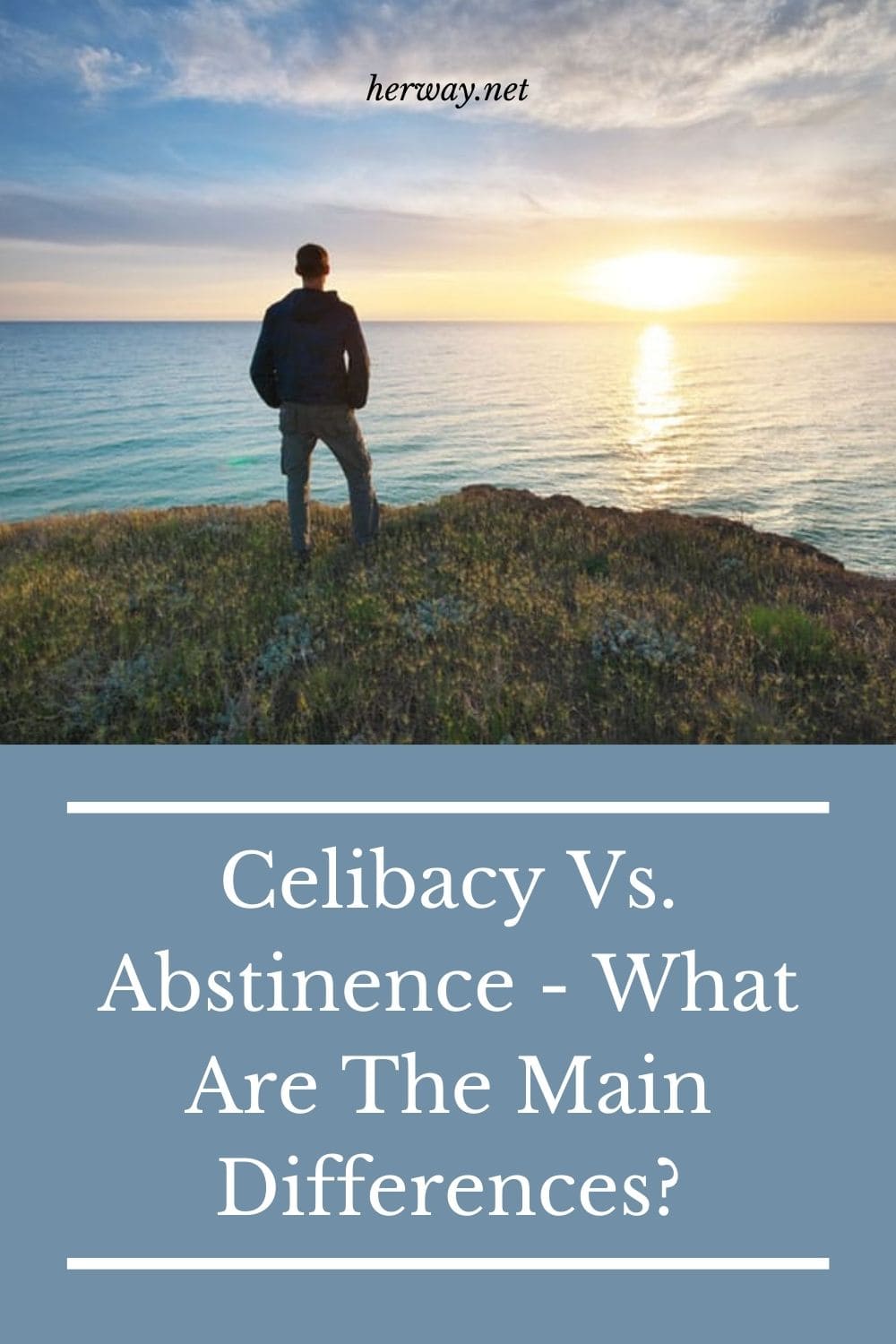Celibacy Vs. Abstinence – What Are The Main Differences?
Celibacy and abstinence are two terms that are closely intertwined and that is the main reason why they are so easily misinterpreted.
They both refer to a strict avoidance of all forms of sexual activity aka sexual intercourse and the main difference lies in the reasons behind one’s choice to be celibate or abstinent . (Stay tuned because now comes the most confusing part of the celibacy vs abstinence scheme).
Typically, the term celibacy is used to denote a person who chooses to remain unmarried for the sake of religious vows or we could say for religious reasons ( religious beliefs ).
But the truth is that celibacy can also be a voluntary choice or abstinence for just any reason as well.
So, even though celibacy and abstinence are often used interchangeably, in a nutshell, they significantly differ from one another.
CELIBACY

As already said, the main difference between celibacy and abstinence lies in the fact that celibacy is perceived as a religious vow , which is also called religious celibacy .
Basically, the vow of celibacy is one’s voluntary decision to remain unmarried and refrain from sexual activity and sexual relations for the sake of fulfilling a religious vow .
In this context, celibacy is a broader term, contrary to abstinence. It is the act of abstaining from sexual intercourse because of worshipping religious vows of chastity.
It can be seen as a lifestyle choice where you commit your body and soul to other, more fulfilling things than just earthly pleasures.
Choosing to be in a state of caelibatus is a total devotion to celebrating pureness and it is the act of self-control that has the power of improving one’s self-awareness, sexual health , mental health and perspectives on different things.
Celibacy in religion

To understand it better, we need to go back in time and learn about the origins of celibacy.
It is believed that celibacy has existed since ancient times for the sake of population control (as an alternative to birth control ) which can also be interconnected with Catholicism —the Catholic church .
In Christianity, celibacy has arisen from various religious texts where an individual’s sexuality is not perceived as a gift that should be used for self-pleasure but is instead seen as a means to procreation, which means that people who follow this agenda choose to have sex only for the sake of bringing another human being to the world—giving birth to a child.
Another term that is connected with Christianity’s perception of celibacy is sinful thoughts.
So, according to some Christian people, being celibate doesn’t only mean refraining from the enjoyment of the physical aspect (intercourse, outercourse or oral sex ) but it also means preventing your mind from indulging in sinful thoughts as well.
It is a lifestyle where you celebrate chastity and protect yourself from any kind of sin (be it physical or one created by the mind) because the body and mind are perceived as one.
To sum up, it means that if you stay away from the physical pleasures, your mind will also remain pure because it will not be under the influence of sinful thoughts.
And having a pure mind means having a pure soul , which has always been one of the most important things in most major religions throughout history, like Buddhism , Hinduism , etc.
Today, for male and female members of the active clergy, the vow of celibacy is mandatory and most female religious celibates are Catholic nuns residing in residential convents.
Religious celibacy vs non-religious celibacy

As already said, religious celibacy is described as mandatory celibacy between male and female members of the active clergy.
The main reason why celibacy is a prerequisite in this context is because of the need for ritual purity, which means that only priests who possess this purity are eligible to speak to God on their behalf.
Basically, religious celibacy proposes that sexual activity is contaminating for a priest’s purity and that is why religious celibacy in the form of strict continence from earthly pleasures and sinful thoughts is prescribed as mandatory.
Contrary to this, a non- religious celibacy lifestyle is not usually connected with a religion, even though in some cases it is but only to a certain extent.
To be more precise, there are many reasons why someone would choose to follow non- religious celibacy such as:
- the need to solely focus on other, more important aspects of one’s life (career or education, for example)
- being hurt or dissatisfied by previous sexual encounters
- the need to worship purity or ‘proper behavior’
- avoiding sexually transmitted infections
- the need to preserve a tradition that suggests abstaining from sexual activity before marriage
There are many other reasons for choosing non- religious celibacy and they all vary in accordance with an individual’s background, beliefs and lifestyle.
See also: Five Important Facts You Should Know About Physical Intimacy In Marriage
ABSTINENCE

Just as with celibacy, sexual abstinence is also a form of self-control that is usually limited to a certain period of time and the reasons for choosing such a lifestyle vary from person to person.
These reasons can be connected to psychological, socio-psychological, ethical or legal struggles or issues.
Women usually practice sexual abstinence during fertile periods, while men practice sexual abstinence mostly for medical and social reasons.
There is also a notion that men may indulge in abstinence as a means to preserve their masculinity because being with a woman can be considered to be an act of giving away a man’s power.
Interestingly, the Federal Government of the United States has created several programs for the purpose of promoting abstinence among teenagers.
There have also been programs intended to encourage unmarried adults to abstain from any type of sexual activity before marriage.
CELIBACY VS. ABSTINENCE

First of all, it is important to make a distinction between celibacy, abstinence and asexuality because celibacy and abstinence are basically a voluntary choice , whereas asexuality stands for a sexual orientation.
Furthermore, celibacy doesn’t mean abstinence and abstinence doesn’t mean celibacy, even though they are closely interconnected.
Celibacy is a form of worshipping religious vows and following a given guideline that will help preserve the purity of one’s body and soul.
Contrary to this, abstinence doesn’t necessarily stem from religion-based issues.
Therefore, sexual abstinence is a wider term that encompasses a variety of reasons and issues that could motivate an individual to live such a lifestyle.
See also: How Abstinence Helped Me Meet The Right Guy








